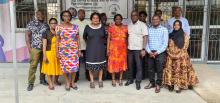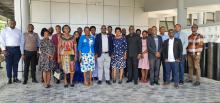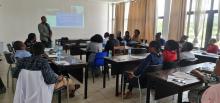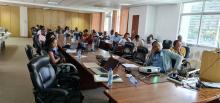WHO supports introduction to antibiotic stewardship in three hospitals
Antimicrobial resistance is a growing problem nationally and globally that requires concerted efforts of a wide range of stakeholders to address it successfully. Inappropriate use of antimicrobial medicines is among the main drivers of antimicrobial resistance (AMR). Due to its complexity, tackling AMR requires a comprehensive set of interventions that include Anti-Microbial Stewardship (AMS), hospital hygiene, use of diagnostic tests to support prescribing and mass media campaigns for optimal antimicrobial use, among others.
Since 2018, the World Health Organization has been working closely with the Ministry of Health to conduct point prevalence surveys in 14 hospitals to provide baseline data on antibiotic use in the hospitals. These data have served as a starting point for identifying gaps and carrying out the necessary interventions to optimize antibiotic use in these facilities.
This year between April and May 2022, using the WHO`s toolkit for antimicrobial stewardship programmes in healthcare facilities in low- and middle-income countries, the WHO Country Office has supported the Ministry of Health to build capacities of the newly constituted antimicrobial stewardship committees in three hospitals on the concept of AMS. The hospitals supported included the Muhimbili National Hospital, Mwananyamala Regional Referral Hospital and Dodoma Regional Referral Hospital. The training started with the orientation of the Hospitals’ Management Teams on the global and national strategies to combat AMR. They were also provided with the results of the previous surveillance study on antimicrobial use. In addition, they were introduced to AMS and why they should support AMS in their institutions. Antimicrobial stewardship programmes optimize the use of antimicrobials, improve patient outcomes, reduce AMR and health-care-associated infections, and save health-care costs amongst others.
For the AMS teams, training included a step-by-step detailed guidance on how to establish an AMS programme, plan, perform and assess AMS interventions. It also included the collection of the second data on antimicrobial use so as to compare their current use of antibiotics to the previous surveillance data. After the training, the AMS committees developed plans of action which they were encouraged to include in the next financial year’s Comprehensive Hospital Plans.
World Health Organization (WHO) defines AMS as a coherent set of integrated actions which promote the responsible and appropriate use of antimicrobials to help improve patient outcomes across the continuum of care. This optimal use of antimicrobials includes their prescribing only when needed, selection of the optimal drug regimen, drug dosing, route of administration and duration of treatment following proper and optimized diagnosis. These actions are complemented by access to affordable and quality antimicrobials. implementation of infection prevention and control (IPC), enhancing water, sanitation and hygiene (WASH), and optimizing vaccination coverage.
Tanzania is currently implementing a National Action Plan on AMR (2017 – 2022) to address Antimicrobial Resistance (AMR) in the country.
Tel: +255 754 222 263
Email: shijar [at] who.int (shijar[at]who[dot]int)
Communications and Media Officer
WHO Country Office, United Republic of Tanzania
Tel:+255 22 2111718/2113005
Mobile:+255 743 958599
Email: mwijarubim [at] who.int (mwijarubim[at]who[dot]int)




